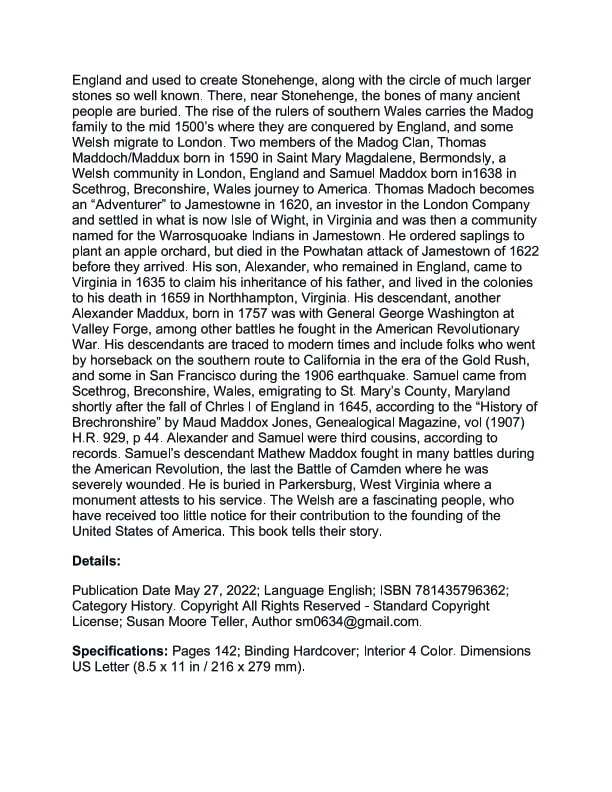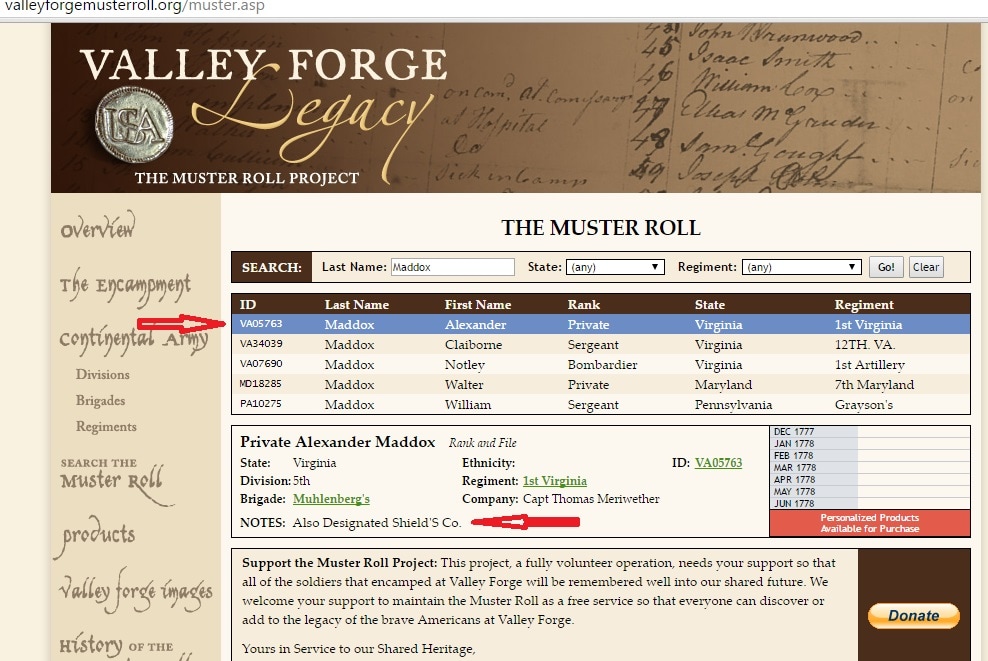- In May of 2022, The Welsh in Colonial America was published. It is available for sale from author Susan Moore Teller and other sites, i.e. bookstores. websites, etc. See above.
The Discovery of America - by the Welsh prince Madog in the 12th century (historic-uk.com)
.~.
Alexander Maddux, Pvt. VA
(1757 VA-abt. 1855 AR), was with General George Washington
at Valley Forge
by Susan Moore Teller: [email protected]
Valley Forge, Pennsylvania, was the site of the camp of the American Continental Army over the winter of 1777-1778 in the American Revolutionary War. This was a time of great suffering for George Washington's Army, but it was also a time of retraining and rejuvenation.
With the winter setting in, the prospects for further campaigning were greatly diminished, and Washington sought quarters for his men. Though several locations were proposed, he selected Valley Forge, Pennsylvania, 22 miles northwest of Philadelphia. It proved to be an excellent choice. Named for an iron forge on Valley Creek, the area was close enough to the British to keep their raiding and foraging parties out of the interior of Pennsylvania, yet far enough away to halt the threat of British surprise attacks. The high ground of Mount Joy and Mount Misery, combined with the Schuylkill River to the north, made the area easily defensible.
On December 19, 1777, when Washington's poorly fed, ill-equipped army, weary from long marches, struggled into Valley Forge, winds blew as the 12,000 Continentals prepared for winter's fury. Grounds for brigade encampments were selected, and defense lines were planned and begun. Within days of the army's arrival, the Schuylkill River was covered with ice. Snow was six inches deep. Though construction of more than 1,000 huts provided shelter, it did little to offset the critical shortages that continually plagued the army.
Soldiers received irregular supplies of meat and bread, some getting their only nourishment from "firecake," a tasteless mixture of flour and water. So severe were conditions at times that Washington despaired "that unless some great and capital change suddenly takes place ... this Army must inevitably ... Starve, dissolve, or disperse, in order to obtain subsistence in the best manner they can." Animals fared no better. Gen. Henry Knox, Washington's Chief of Artillery, wrote that hundreds of horses either starved to death or died of exhaustion.
Clothing, too, was wholly inadequate. Long marches had destroyed shoes. Blankets were scarce. Tattered garments were seldom replaced. At one point these shortages caused nearly 4,000 men to be listed as unfit for duty.
Undernourished and poorly clothed, living in crowded, damp quarters, the army was ravaged by sickness and disease. Typhus, typhoid, dysentery, and pneumonia were among the killers that felled as many as 2,000 men that winter. Although Washington repeatedly petitioned for relief, the Congress was unable to provide it, and the soldiers continued to suffer. Women, relatives of enlisted men, alleviated some of the suffering by providing valuable services such as laundry and nursing that the army desperately needed.
Upgrading military efficiency, morale, and discipline were as vital to the army's well-being as was its source of supply. The army had been handicapped in battle because unit training was administered from a variety of field manuals, making coordinated battle movements awkward and difficult. The soldiers were trained, but not uniformly. The task of developing and carrying out an effective training program fell to Baron Friedrich von Steuben. This skilled Prussian drill master, recently arrived from Europe, tirelessly drilled and scolded the regiments into an effective fighting force. Intensive daily training, coupled with von Steuben's forceful manner, instilled in the men renewed confidence in themselves and their ability to succeed.
Soon word of the British departure from Philadelphia brought a frenzied activity to the ranks of the Continental Army. On June 19, 1778, six months after its arrival, the army marched away from Valley Forge in pursuit of the British who were moving toward New York. An ordeal had ended. The war would last for another five years, but for Washington, his men, and the nation to which they sought to give birth, a decisive victory had been won -- a victory not of weapons but of will


